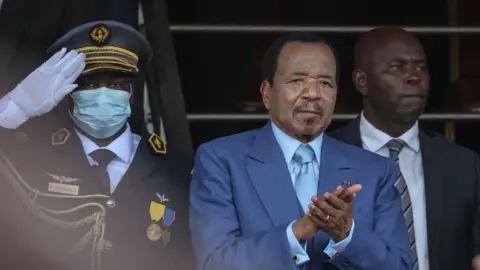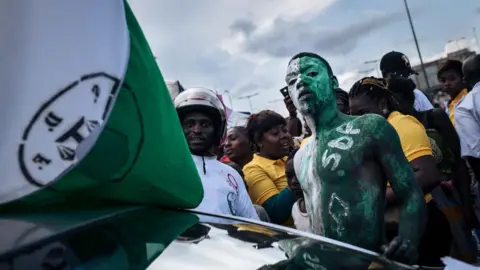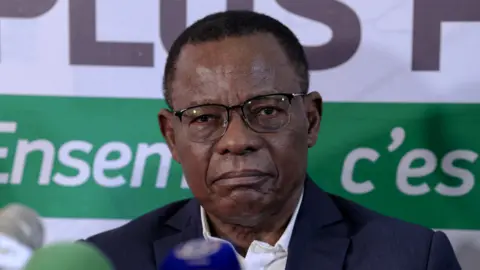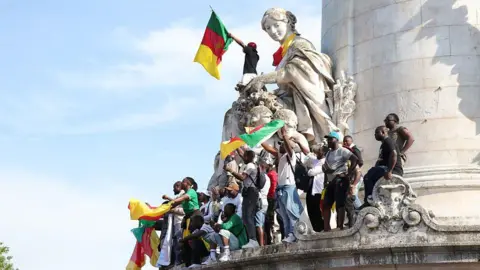BBC News
 AFP through Getty Image
AFP through Getty ImageThe Constitutional Council of Cameron has upheld the decision by the country’s election body to exclude opposition leader Mauris works from the October 12 presidential election.
While the firebrand political person was sidelined, 92 -year -old President Paul Biya, whose candidature also faced opposition, was approved to run for what would be his eighth term in the oil -rich Central African nation.
If he was elected for a tenure of one and seven years, he could live in power until he was almost 100.
Work was rejected as a rival group of the Manidem party that supported him, presented another person as a candidate, highlighting an internal squall.
His boycott expressed displeasure, his lawyers described the rejection of his petition as more political than a legal step.
Who are the main candidates?
Of the 83 candidates, who submitted their applications to the election body, only 12 have been approved.
For multiple candidates from the same party, the reasons given by Cameron (ELECAM) for disqualification of 71 range from incomplete files, reasons for disqualification of 71 range from incomplete files.
Of all the contestants, six are seen as the main contender:
1. Paul Biya
At the age of 92, Paul Biya is the oldest serving state in the world. He has been in power for nearly 43 years since 1982. Bia leads the ruling CPDM party which dominates the political scenario. He is widely considered favorite, now his main rival, work, out of the way.
The experienced politician has never contested since the return of multi-party politics in 1990. However, his victory has been killed by allegations of vote rigging-who have been constantly denied by his party and government.
Announcing his intentions to run, Bia said that his eighth mandate would focus on the good of women and youth.
2. Bello Bauba Migari
78-year-old Bello Buba Migari is an experienced politician who lives from the vote-rich northern region of Cameroon.
He is the President of the National Union for Democracy and Progress (NUDP) party established in 1990. He served in the governments of both the Presidents of Cameron -Hamdou Ahidjo and Paul Biya.
In fact, he was the first Prime Minister of Bia between 1982 and 1983. Since 1997, Magary has formed an alliance with Bia’s CPDM party, which helped the important votes from the north.
However, this political marriage ended in June after pressure from within his party to run independently.
While serving as Minister of State for Tourism and Holiday, Migri announced his resignation and declared himself a candidate against Bia, which he also faced in the 1992 presidential election.
3. Isa Tachiroma Bekari
Another former Biya colleague whose candidature has come as a wonder, 75 -year -old Isa Tchiroma Bakri. Like Migari, he is from the north of the country and has been impressive in helping Bia secure the votes of the region.
After a 20 -year tenure in various government roles, Tchiroma finally pulled a plug on his time with a 92 -year -old leader, resigning from his role as the Minister of Employment and Vocational Training to declare his candidature.
The head of the Cameron National Salvation Front (CNSF) party, Tchiroma criticized Biya’s governance style and hinged his president’s dialect on the promise of overhale the system, which he described as “knee”.
 AFP through Getty Image
AFP through Getty Image4. Cabral Libi
The National Recalls (PCRN) president Cabral Libi is a vibrant member of the Parliament who is making its second effort to get the country’s top jobs for the Cameron Party.
In 2018, he was the youngest of nine presidential candidates, who was only 38 years old, who was third with 6% of the votes.
In this year’s election, Libii’s candidature was challenged by PCRN founder Robert Kona, who disputed the legitimacy of the legalist to lead the party.
However, the Constitutional Council dismissed the corner’s petition and upheld the election body’s decision to allow Libi to stand up.
5. Akre Mun
Acre Muni was a candidate in the 2018 presidential election, but took out at the last minute and thrown his weight behind the work. This time, a staunch international anti -corruption lawyer Munit says that he wants to challenge himself.
The 72-year-old is from a family of politicians-his late father Solomon Tandeng Muni served as the Prime Minister of West Cameron after independence, the Vice President of the then Federal Republic of Cameron and President of the National Assembly.
As the Speaker, Solomon Muni took oath in Bia, when Ahmedau Ahido took over as President after resigning.
Money is promising to get rid of corruption and bad rule of bad rule that he says that he has created his image in the international scenario.
6. Joshua Osih
Joshua After its first attempt in 2018, OSIH is jumping in the presidential race for the second time.
He is the head of the Social Democratic Front (SDF) party, who succeeds the prestigious heavenly opposition leader John Fru NDI. SDF used to be the main opposition organization of the country, but later its impact decreased, in 2023 in 2023, with the expulsion and expulsion of several party members in 2023.
The 56 -year -old Osih came fourth in the 2018 elections with 3%, but is expecting to defeat Biya through a promise of social and institutional reforms.
 AFP through Getty Image
AFP through Getty ImageWho is the strongest challenge for Bia?
For several decades, President Bia has been successful in maintaining a strong hold on power, making it difficult for him to lose elections.
Political heavyweight Bello Buba Migari and Issa Tchiroma Bakery’s decision appeared to make them more difficult to make life more difficult, but some analysts believe that they do not pose a significant threat to Bia.
A policy analyst with Cameronian think-tank Nkafu Policy Institute, Dr. Pippy Hughes argues that their alliance with the current regime reduces their credibility with opposition voters.
“Cameron needs more than just one resignation to rely on them,” he told the BBC. “Both are with systems and look at the nation.”
Dr. Hugus further suggested that two northern candidates may be part of a political conspiracy staged by the government.
However, the ruling party officials have depicted breakdown as real, accepting that CPDM can struggle to get several votes from the answer as before.
Given the boycott of the work in 2018, Bia’s strongest challenger, third -placed Libii, may definitely claim their main threat this year.
Although he got only 6% of the votes, the political development of Libii has been praised again.
He led his party to win five seats and seven local councils in Parliament during the 2020 legislative and municipal elections. Since becoming a Member of Parliament in this process, he has challenged the government on major policy issues, if he promises extensive changes when he takes over the reins of power.
However, Dr. Hughes states that Libi’s vision is opaque, cited as a more solid candidate with a very clear project for the nation of about 30 million people.
He said, “Muni has a treasure of international experience and diplomatic character, and this is now the nation,” he said, while praising the famous lawyer’s five -year transition plan, “placed the nation back on track”.
Can the opposition unite?
Historically, Cameron’s opposition is specifically fragmented during elections, analysts said that it has denied them.
Prior to this year’s presidential election, there is a lot of talk about the need of the opposition to unite and harmonize strategies to take Bia. But with prioritizing each candidate to his own interests, it is not clear whether most – alone – all of them will work together, despite the risk it can help the President.
Civil society leader Felix Egbore Bella said, “This may be the end of their political career, or their parties, if they do not come together,” said Felix Egbor Balla, the civil society leader.
He told the BBC, “Work and others should look for someone in the opposition who can take the baton – and they must first keep the nation, to look for a consensus candidate should rise above his personal ego who can give CPDM a run on October 12,” he told the BBC.
 Anadolu through Getty Image
Anadolu through Getty ImageDr. Hughes agree that the work should use its impact to the support drums for an opposition coalition as he is now out of the race.
He insists that “change (only) should not be with him (work), but the change may come through him”.
He said that an opposition alliance is possible and referred to a meeting to participate in part of opposition figures in the city of Faamban in the western region on 2 August.
The United Socialist Democratic Party (USDP) President Prince Michael Ekoso, who attended the meeting, told the BBC that the objective was to formulate the basis for “consent candidates”.
While no specific candidate has been nominated yet, the criteria of the idea were determined.
“We want a figure that is going to respond to the aspirations of Cameronian, someone who is flexible to work with others, someone who is bilingual and capable of gathering other candidates and political actors,” said Ekoso.
In the 1992 presidential election, Firebrand’s opposition leader John Fru NDI was supported by the Union for Change, a coalition of political parties and civil society organizations.
Although he was not the only opposition candidate, analysts say the coalition helped him get 36% of the votes – just shy by 40% of Biya.
This closest has been found to be beaten by anyone closer. Fru NDI also claimed victory, but the authorities dismissed the allegations of vote rigging and confirmed Bia as the winner.
Many believe that if the opposition does not band together in 1992, Bia may have an easy ride for the presidency.
“They have an experience, human resource and system for their benefits,” Dr. Hughes say.
More about Cameron from BBC:
 Getty Image/BBC
Getty Image/BBC